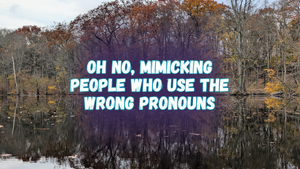Being a supportive trans ally can be difficult, because if you're not trans, you may not realize what is helpful or not helpful.
I've collected a number of helpful and not helpful behaviors that I'd like to share with you. By reading about these here, you can be better prepared to show understanding and empathy next time someone comes out to you.
Amplify Respect is a newsletter to uplift and inform trans folks and allies.
If you find it helpful to learn how to talk about a trans family member, how to promote your work as an LGBTQ+ creator, or how to write about trans people respectfully, you should subscribe.

What's helpful and what's not helpful?
I'll share some approaches that are helpful and not helpful when a trans person comes out to you. This cannot possibly cover all scenarios, just a selected few that happen often.
If you recognize some of your own behavior in the "not helpful" column, that's probably because these are all really common. This is the behavior we have been indoctrinated into.
That's why I've labeled the column "not helpful" instead of "we hate you," okay? This is a resource to learn and develop more understanding and empathy, and gradually move from "not helpful" to "helpful."
| Helpful | Not Helpful |
|---|---|
| Listening and taking time to think before responding when someone comes out to you | Letting your initial emotions take over and saying whatever comes to mind immediately |
| Sharing that you are an ally and support trans, queer, and gay people (whether or not you have out LGBTQ+ family members) | Just waiting for them to come out, without ever revealing you would have been supportive |
| Appreciating that your child trusts you enough to come out to you | Grieving your living child as though they were dead |
| Asking if they'd like to get some new clothes with your assistance | Comparing trans people to costumes or offensive stereotypes: "man in a dress", "bearded lady", cross-dressing, and drag can all be positive self-expression for some folks, but comparisons may be offensive and hurtful to someone who is wearing everyday clothes and not intending to perform |
| When you get a pronoun wrong, saying, "sorry, I meant..." without making a big deal out of it | Profuse, repeated, or private apologies that make everyone uncomfortable |
| Listening to kids and try to understand when they tell you who they are | Thinking that kids are too young to know anything about themselves and telling them who they are "supposed" to be |
| Practicing new names and pronouns regularly on your own | Just winging it and messing up names and pronouns most of the time |
| Understand that "passing" is impossible or uninteresting for many trans people | Assume that "passing" is the goal and question all decisions that do not lead to "passing" |
| Making it clear you love the person who's come out to you | Using your "love" as a bargaining chip to try to make this person change |
How to be supportive as an ally: Learn more



Amplify Respect is a newsletter to uplift and inform trans folks and allies.
If you find it helpful to learn how to talk about a trans family member, how to promote your work as an LGBTQ+ creator, or how to write about trans people respectfully, you should subscribe.
What has been helpful or not helpful for you? Let us know in the comments.








